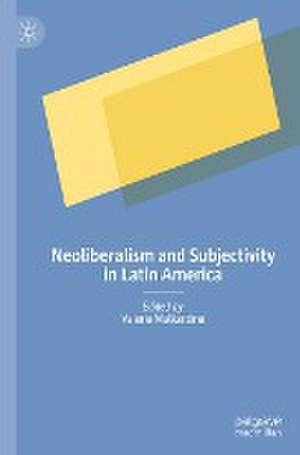Neoliberalism and Subjectivity in Latin America
Editat de Valerie Walkerdineen Limba Engleză Paperback – 29 oct 2023
| Toate formatele și edițiile | Preț | Express |
|---|---|---|
| Paperback (1) | 688.31 lei 6-8 săpt. | |
| Springer International Publishing – 29 oct 2023 | 688.31 lei 6-8 săpt. | |
| Hardback (1) | 694.37 lei 6-8 săpt. | |
| Springer International Publishing – 29 oct 2022 | 694.37 lei 6-8 săpt. |
Preț: 688.31 lei
Preț vechi: 809.77 lei
-15% Nou
Puncte Express: 1032
Preț estimativ în valută:
131.71€ • 137.80$ • 109.41£
131.71€ • 137.80$ • 109.41£
Carte tipărită la comandă
Livrare economică 02-16 aprilie
Preluare comenzi: 021 569.72.76
Specificații
ISBN-13: 9783031178573
ISBN-10: 3031178572
Pagini: 114
Ilustrații: V, 114 p.
Dimensiuni: 155 x 235 mm
Greutate: 0.18 kg
Ediția:1st ed. 2022
Editura: Springer International Publishing
Colecția Palgrave Macmillan
Locul publicării:Cham, Switzerland
ISBN-10: 3031178572
Pagini: 114
Ilustrații: V, 114 p.
Dimensiuni: 155 x 235 mm
Greutate: 0.18 kg
Ediția:1st ed. 2022
Editura: Springer International Publishing
Colecția Palgrave Macmillan
Locul publicării:Cham, Switzerland
Cuprins
Chapter 1. Neoliberalism and subjectivity in Latin America (Valerie Walkerdine).- Chapter 2. Why should we be interested in the specificity of subjectivity and neoliberalism in Latin America?(Julián Medina-Zárate, Flávia M. Uchôa de Oliveira).- Chapter 3. Masculine subjectivities and necropolitics: precarization and violence at the Mexican margins (Antar Martínez-Guzmán).- Chapter 4. Crisis and transformation of occupational identities in three sectors (retail, mining, state): contributions to understanding workplace subjectivities in neoliberal Chile (Antonio Stecher, Álvaro Soto Roy).- Chapter 5: Outsourcing and the growing precarity of psychologists’ work in social services in Brazil: repercussions for subjectivities (Mariana Prioli Cordeiro, Leny SatoFabio de Oliveira).- Chapter 6: Analysing the artefacts to produce an education of quality: from the disciple to the customer in a Colombian university (Hernán Camilo Pulido-Martínez).- Chapter 7: Being a parent and being a child inChile today: the relational construction of subject positions in a neoliberal context (Ana Vergara, Mauricio Sepúlveda, Irene Salvo).
Notă biografică
Valerie Walkerdine is Professor in the School of Social Sciences at Cardiff University, Wales.
Textul de pe ultima copertă
This book examines subjectivity and neoliberalism in Latin America. The chapters, first published in the journal Subjectivity, cover a range of topics, from work to childcare to violence to university education. In the Introduction, Julian Medina Zarate and Flavia Uchoa point out the complex history of the arrival and take-up of neoliberalism across the continent, the deep-seated role of colonial and post-colonial violence, thus the specificity of modes of governance in the complex relationship between the North and the South. The chapter by Antar Martinez Guzman considers the role of neoliberalism in the huge rise in male violence across the country, exploring hyper-violent masculinities in the context of social precarity. Antonio Stecher and Alvaro Soto Roy discuss the transformations in work identities and thus the consequences for subjectivity for workers in three kinds of employment in neoliberal Chile. Fabio d’Oliviera studies phsychologists operating in an increasingly precarised service sector in public assistance programmes in Brazil. Hernan Pulido Martinez explores the role of artefacts in the introduction of discourses and practices related to quality within a university in Colombia. Ana Vergara discusses parent-child relations in the context of neoliberal Chile.
Valerie Walkerdine is Professor in the School of Social Sciences at Cardiff University, Wales.
Caracteristici
Examines the effects of the complex history of the arrival and take-up of neoliberalism across the continent Provides context for popular uprisings against neoliberalism are taking place in many Latin American countries Underlines the complexity of the relationship between the South and the North
